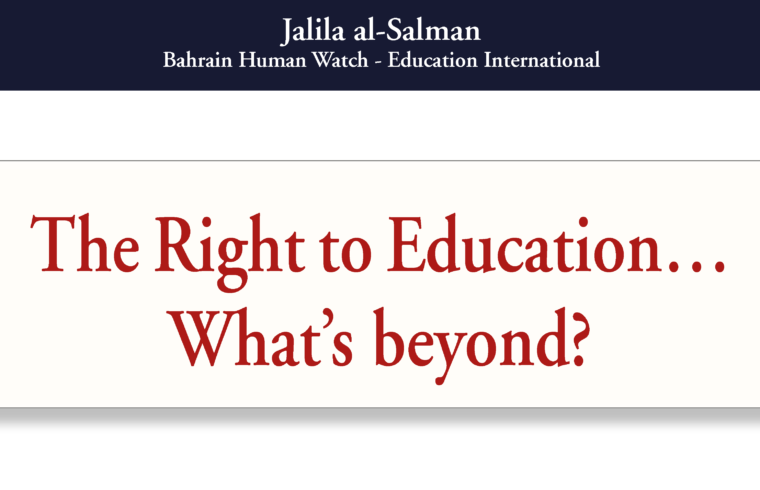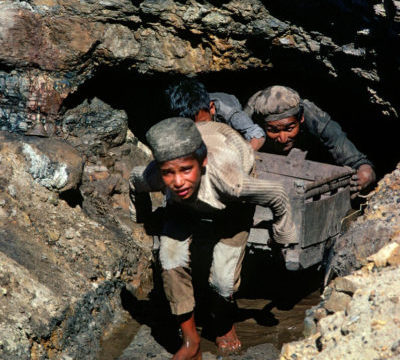Jalila al-Salman
Bahrain Human Watch – Education International
The Universal Declaration of Human Rights distinctly states the HRs which governments must defend and protect. Article 2 states that “Everyone is entitled to all the rights and freedoms set forth in this Declaration, without distinction of any kind, such as race, color, sex, language, religion, political or other opinion, national or social origin, property, birth or other status. Furthermore, no distinction shall be made on the basis of the political, jurisdictional or international status of the country or territory to which a person belongs, whether it be independent, trust, non-self-governing or under any other limitation of sovereignty.” Article 21-2 stats that “Everyone has the right to equal access to public service in his country.” Article 26-1 states that “ Everyone has the right to education. Education shall be free, at least in the elementary and fundamental stages. Elementary education shall be compulsory. Technical and professional education shall be made generally available and higher education shall be equally accessible to all on the basis of merit.”, and Article 30 states that “Nothing in this Declaration may be interpreted as implying for any State, group or person any right to engage in any activity or to perform any act aimed at the destruction of any of the rights and freedoms set forth herein.”
Those articles form the basis of what will be shown next. Although the framework of rights is clearly set, and followed by explanatory appendices, its soul is not present during enforcement. As an HRD I found it frustrating to live such contrast, in particular the Right to Education.
When Education was recognized as a fundamental human right, all measures that were insight -at that timehad been taken into consideration to protect and defend this vital right which composes all aspects of living. Unfortunately, years later, with all the difficulties the world lived and passed through, those measures did not cover all the needs and we are still witnessing serious violations to this right under different circumstances. Apparently, all the violations are justifi ed either by political reasons or by laws created specifi cally to counterbalance those violations when revealed to the world as meaningful justifi cations to absorb any expected anger.
New agreements are in place, and governments who signed and rectified them are supposed to fulfi ll them. They might legislate new laws which look perfect on paper, but what the real situation would be? Why are people in many countries complain about being denied to this right? And basically, why governments feel bad about people demanding their rights and fighting to gain them? Why is the right to education being violated?!
If we agreed on the importance of the Right to education in shaping minds and opening unlimited questions about all life manners,
If we believed that the Right to education could change our lives and the prospect of the future,
If we used Education as a manifest to change our destiny,
If we stamped our livelihood with the effects of education,
Only then, we might have a clear idea why the Right to Education is gravely violated and masked brightly to show the opposite.
Although right to education is protected in areas of wars and confl icts except that those areas are not clearly defined leaving areas with no classification leading to a clear inconsistency as places with inner confl icts are not covered by defi nition which might be a kind of green light to escalate the violations with any kind of justifi cations according to whom in power, i.e. countries that are seeking more rights from their governments.
In many countries, mine is one, violations are justifi ed either by laws or by politics such as national security. For example, Bahrain Teachers Association (which was functioning as the only teacher’s union in Bahrain), was the only such organization which dissolved during the public rights movement in 2011 and its leaders were jailed and tortured under the accusation of over troughing the regime based on BTA participation in the movement. BTA which was doing its mandate in defending right to education, teachers right, students’ rights and the profession of teaching was and still being classified as illegal because of its role agreed by law at that time. But as laws are being changed to cover governments ugly face, they found the correct wording to illegalizing the organization and criminalizing its leaders and members. Dissolving BTA left teachers and students without anyone looking after their interests and defending them something which we consider as a violation in its own.
As we are following up the situation in my country, the contradictory is shining as the government is raising the flag of the importance of education, signing number of treaties, generating education law and setting huge budgets on Education but on the other hand large number of juveniles are in jail for political reasons denied or with limited access to education. In 2011, more than 140 university students were sent to court in what was known as “University case” for a sit in in front of dean office. Some were sentenced 3-5 years. As a result, they lost their studies and forced to pay high penalties. It is particularly important to say that higher education is completely for bidden in Bahrain prisons.
Despite of founding Nasser center which accepts some school students in prison, many others are facing obstacles placed in front of them, the result of which is to prevent them from completing their studies or to disrupt it for years. In a very direct language, the Right to Education is used as a punishment tool for those under the age of 18 who are sentenced. This is a clear and explicit violation and harm to the individual and his future in addition to being a direct harm to the society that will receive those sentenced on political backgrounds after their sentences ends.
The above examples show only group of violations in relation to the Right of Education. Our sample is people in different ages who were attacked/ sentenced on political basis after the attack on the right movement. Furthermore, the pandemic of Covid-19 reveals another face of violation to the right of Education as policies are implemented regardless the benefi ciaries if they can receive education equally with minimal difficulties. After a year of distance learning, we are still having students with no device or poor/no internet access. Most aids come from society but not covering all while Ministry of Education is continuing its policies and building on them.
All of the above is enough to show the importance of having clearer and wider defi nition for “conflict areas”. Moreover, there is a high demand on policies to protect the right and hold every violator accountable, whoever he is. Local laws must be enacted to carry out this work in addition to the importance of international monitoring of this matter, and this, in our opinion – if it happens – will reduce the number of those who are exposed to any violation that affects the right to education.











